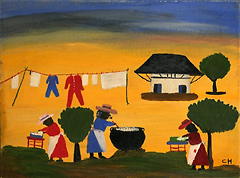Curriculum Materials: Art in America
|
|
Image 23 Clementine Hunter Questions: |
Clementine Hunter
At age 16, Clementine Hunter, whose grandmother and mother were both plantation cooks, moved to Melrose Plantation in Louisiana. There she worked in the cotton fields and later in the main house as a cook. She married and raised her family at Melrose and remained there for the rest of her life. Because Melrose's owner encouraged visual artists, writers, and musicians to visit and work on the plantation, Hunter was exposed to a wide variety of art. She began to paint during the 1940s, when she was nearly 60, using paints and brushes left behind by a visiting artist. Before long, outsiders came to the plantation to buy her paintings.
Hunter is called a folk painter because she had no formal
training and worked outside of the mainstream art world. She
painted the daily activities of the black Americans living
on Melrose and neighboring plantations in a direct and
colorful manner. In addition to weddings, funerals, and
Saturday-night brawls, she painted many scenes of workers
picking cotton, threshing pecans, and boiling wash in the
plantation yard. Hunter's paintings provide a rich sense of
her feelings about plantation life.
|
|
